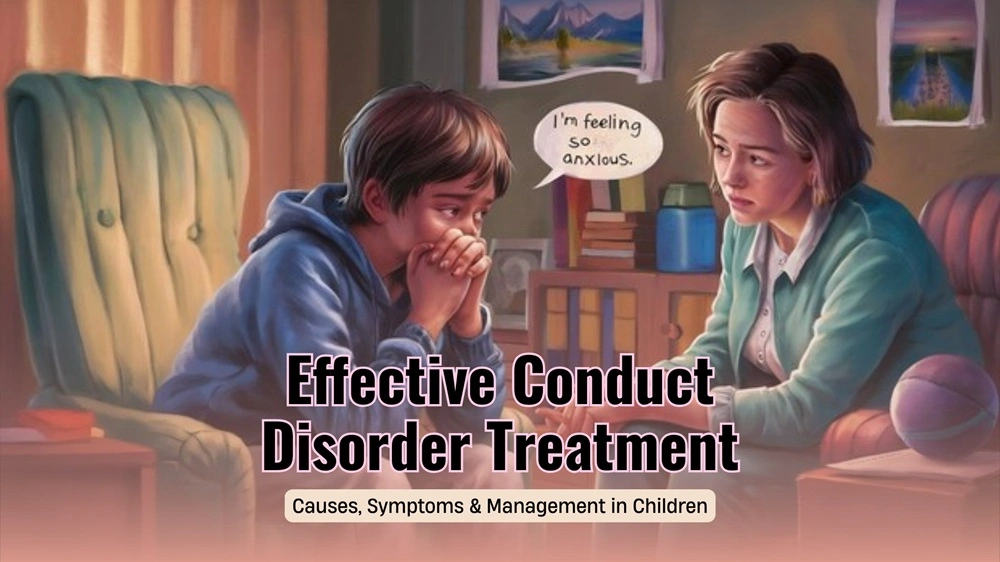
Conduct disorder in children is a complex behavioral and emotional disorder characterized by a persistent pattern of aggressive, disruptive, or defiant behaviors. This condition goes beyond typical childhood misbehavior and may significantly affect a child's social, academic, and family life. At Patna Psychiatry, Dr. Saurabh Kumar, MD (Psychiatry), offers specialized support for children exhibiting these behaviors, making the clinic a reliable destination for the best child psychiatrist in Patna.
Etiology of Conduct Disorder
The etiology of conduct disorder is multifactorial, involving biological, psychological, and environmental factors. While the exact cause is not always clear, research indicates a combination of genetic predispositions and external influences. Children with a family history of mental health disorders or antisocial behavior are more susceptible. Environmental triggers, such as inconsistent parenting, exposure to violence, or neglect, can also play a critical role.
Neurological studies suggest that abnormalities in brain areas responsible for emotional regulation and impulse control may contribute to the development of conduct disorder. Hormonal imbalances and early trauma can further exacerbate these behaviors. Understanding the etiology of conduct disorder is essential in tailoring effective treatment plans.
Types of Conduct Disorders
There are several types of conduct disorders, which can vary in severity and presentation:
- Childhood-Onset Conduct Disorder: This type is identified when symptoms emerge before a child turns 10 years old. These children often exhibit aggressive behavior, property destruction, and lying.
- Adolescent-Onset Conduct Disorder: Symptoms develop after the age of 10. This type often involves rule-breaking behaviors, truancy, and minor criminal activities rather than overt aggression.
- Unspecified Onset: When it is unclear whether symptoms began in childhood or adolescence, the disorder is categorized as unspecified.
Recognizing these types of conduct disorders is crucial for early diagnosis and intervention, as each type may require a slightly different conduct disorder treatment approach.
Symptoms of Conduct Disorder in Children
The signs of conduct disorder in children can be divided into four main categories:
- Aggression to People and Animals: This includes bullying, threatening, physical fights, and cruelty to animals.
- Destruction of Property: Children may engage in deliberate property damage, vandalism, or arson.
- Deceitfulness or Theft: Persistent lying, stealing, or manipulation are common.
- Serious Violations of Rules: Truancy, running away from home, or substance abuse may occur.
It is important to note that occasional misbehavior does not necessarily indicate a conduct disorder. A consistent and persistent pattern of these behaviors often signals the need for professional evaluation.
Diagnosis of Conduct Disorder
Diagnosis involves a comprehensive assessment by a qualified child psychiatrist. At Patna Psychiatry, the evaluation process includes:
- Detailed behavioral history from parents, teachers, and caregivers
- Clinical interviews and structured questionnaires
- Assessment of co-existing conditions such as ADHD, anxiety, or depression
- Observation of social and academic functioning
Accurate diagnosis is the first step toward effective management of conduct disorder. Early intervention is crucial to prevent escalation into more severe behavioral issues in adolescence and adulthood.
Conduct Disorder Treatment
Conduct disorder treatment typically involves a combination of psychotherapy, family intervention, and sometimes medication. The primary goals are to reduce disruptive behaviors, improve social skills, and enhance emotional regulation.
- Behavioral Therapy: Cognitive-behavioral therapy (CBT) helps children identify triggers, manage anger, and develop problem-solving skills.
- Family Therapy: Since parenting strategies play a vital role, family therapy can improve communication, set consistent boundaries, and reinforce positive behavior.
- Parent Management Training: Parents learn effective techniques to handle challenging behaviors at home.
- Medication: In some cases, medications may be prescribed to manage co-existing conditions such as ADHD, depression, or severe aggression.
The holistic management of conduct disorder ensures that interventions address both the child’s behavioral issues and the family dynamics that may contribute to the condition.
Role of School & Community
Schools and community programs are vital in the treatment and support of children with conduct disorder. Teachers, counselors, and mentors can reinforce behavioral strategies and monitor progress in social and academic settings. Early collaboration between the school and healthcare professionals strengthens the overall conduct disorder treatment plan.
Prognosis & Long-Term Outcomes
With timely intervention and consistent support, many children show significant improvement in behavior and social functioning. Untreated conduct disorder can lead to long-term complications, including academic failure, legal issues, substance abuse, and difficulties in interpersonal relationships. Early treatment by the best child psychiatrist in Patna can make a substantial difference in long-term outcomes.
Conclusion
Conduct disorder in children is a serious mental health concern that requires careful evaluation and tailored conduct disorder treatment. Understanding the etiology of conduct disorder, identifying the types of conduct disorders, recognizing symptoms, and implementing early management of conduct disorder strategies are essential steps toward recovery. At Patna Psychiatry, Dr. Saurabh Kumar, MD (Psychiatry), provides expert guidance and support to families, ensuring children receive the best care possible.
Parents and caregivers observing persistent behavioral challenges in their child should consult with specialists promptly. Early intervention can help children develop healthier coping mechanisms, improve relationships, and thrive academically and socially.
Visitors: 76





No comments yet.